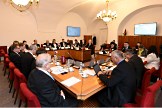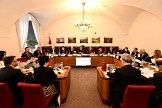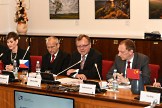A seminar held at the Parliament: SAO experts presented successfully implemented environmental projects
A seminar entitled “Challenges involved in the area of sustainable energy” was held on April 27, 2017, at the seat of the Chamber of Deputies of the Parliament of the Czech Republic under the auspices of Committees on the Budgetary Control and on Environment. At the seminar, experts from the Supreme Audit Office (SAO) presented projects successfully implemented within the frame of the Working Group on Environmental Auditing under the International Organization of Supreme Audit Institutions (INTOSAI WGEA), which currently unites 77 supreme audit institutions from around the world. Attendees to the seminar included delegates from supreme audit institutions (SAIs) of China, USA, Poland, and Slovakia as well as from the European Court of Auditors. Among guests invited to the seminar were members of the Chamber of Deputies and of the Senate as well as representatives from the Ministries of the Environment and of Industry and Trade, from the Office of the Government, and from the Office of the President of the Republic.
“The SAO auditors do not only focus on the effectiveness, efficiency and economy of used resources. We have been improving our auditing skills and would like to efficiently cooperate on the international level. Our focus is on current major issues that we mutually share with other countries”, said President of the SAO Mr. Miloslav Kala. The aim of the seminar was to introduce international activities of the SAO and to discuss new trends and challenges related to audits in the area of renewable energy sources, energy savings, and sustainable energy development.
The first project in this area that the SAO took part in focused on sustainable energy. The project brought together SAIs of Australia, Estonia, Canada, Morocco, Norway, Poland, and Great Britain. A publication entitled “Auditing Sustainable Energy” was published, which describes a methodology that has already been used by foreign audit institutions during their auditing operations. Examples of such audits were presented by a representative from the National Audit Office of the People's Republic of China.
In 2014, the SAO also used this method and performed an auditing operation, which aimed at financial resources used to promote energy from renewable sources. Auditors revealed that photovoltaics required the highest investments and utilised some 66 % of the subsidies into operating costs related to all renewable energy sources, while only producing around 22 % of renewable electricity in 2013. When comparing the Czech Republic with other EU member states, auditors revealed that the production of electricity via photovoltaics significantly increased by 2,320 % during the audited period from 2009 to 2012.
Then the SAO took part in another project, which aimed at energy savings. The project outcomes were presented at the INTOSAI WGEA assembly meeting that was held in v Jakarta, Indonesia, in October 2016. A study was published, which focused on the issue of energy savings and the knowledge’s practical application in audits. When tackling this problem, the SAO cooperated with SAIs of the USA, China, and Slovakia. The U. S. Government Accountability Office representative expressed his appreciation for the project’s contribution and the possibility of sharing the experience in the future auditing operations.
At present, the SAO has been aiming at environmental auditing within the frame of the project entitled “Green Cities – Sustainable Urban Development”. The project has been implemented in a cooperation of SAIs of China, Philippines, Indonesia, Morocco, Slovakia, and the USA. The team of auditors from the SAO who have been working on all the projects is supervised by Member of the SAO Board Mr. Petr Neuvirt.
The U. S. Government Accountability Office representative highlighted the importance of SAIs in the process of searching the solutions of current challenges in areas such as energetics, climate changes, and the sustainable development.
Communication Department
Supreme Audit Office
- The SAO introduction - Jaroslav Broža (pdf, 1814 kB)
- Audit v oblasti udržitelné energie - Příručka pro nejvyšší kontrolní instituce - Helena Vorbová (pdf, 1345 kB)
- Výzvy v oblasti udržitelné energie - příručka Úspory energií - Michal Rampír (pdf, 1825 kB)
- CNAO's practice of energy conservation and utilization audit - Ding Yan, CNAO (pdf, 940 kB)
- ECA audit experience in the field of energy - Helder Faria Viegas, ECA (pdf, 2768 kB)
- Finances earmarked for the support of energy production from renewable energy resources - Benjamín Groll (pdf, 1105 kB)
- Support of energy savings - Jana Pechová (pdf, 1165 kB)
- Funds provided for the improvement of nature and the landscpape - Sylva Müllerová (pdf, 1509 kB)


